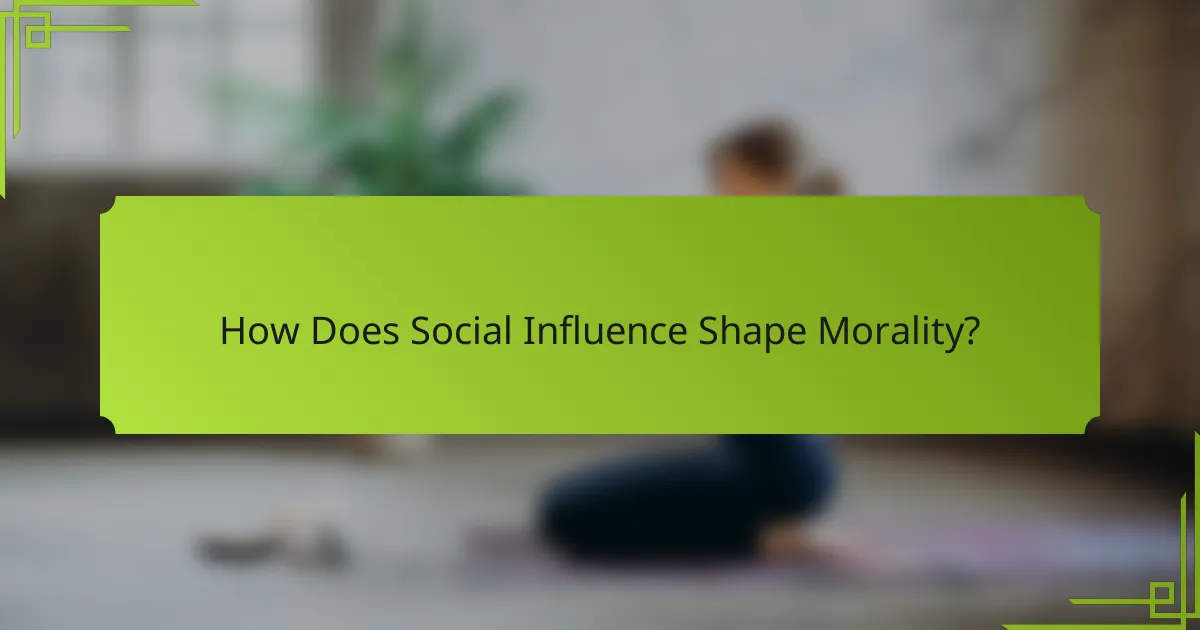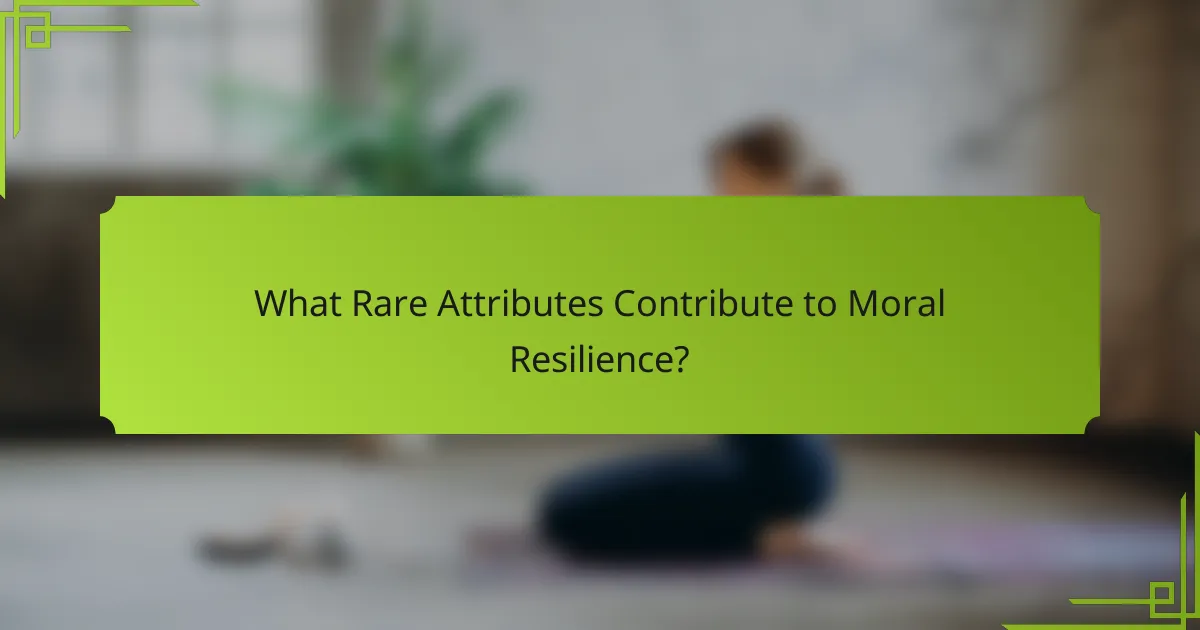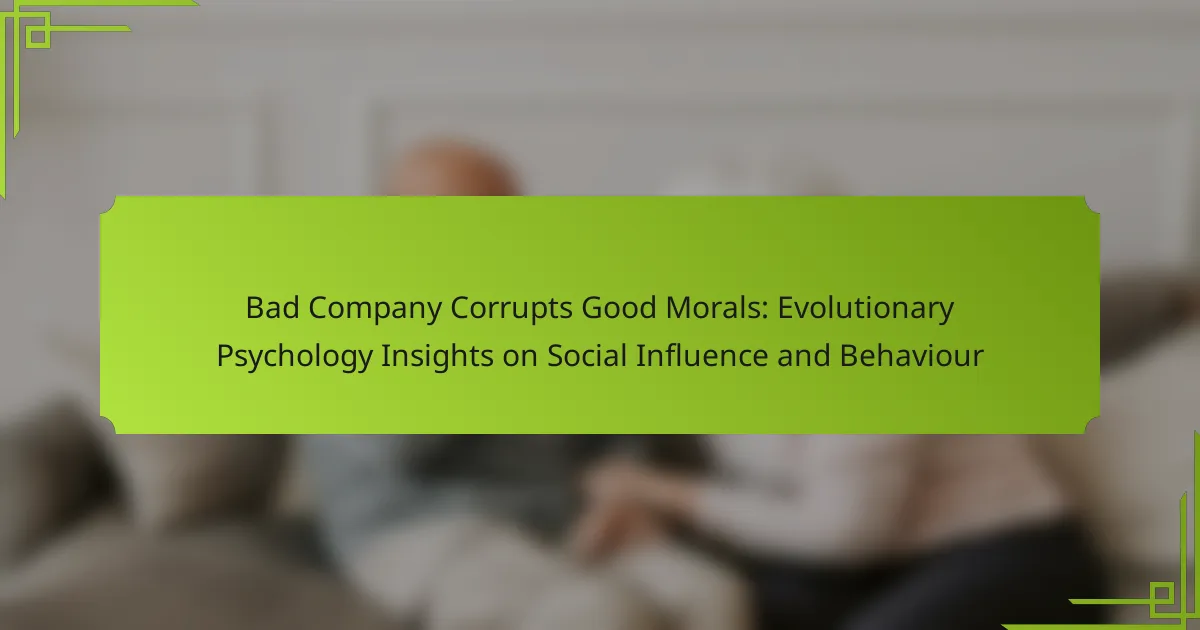Social influence plays a crucial role in shaping moral behaviour, often leading to moral degradation through peer pressure. This article explores how group norms can alter individual moral standards, resulting in unethical actions. It examines the characteristics of bad company that foster conformity and the importance of moral resilience in navigating these challenges. Understanding these dynamics can help individuals maintain their integrity in social contexts.

How Does Social Influence Shape Morality?
Social influence significantly shapes morality by altering individuals’ beliefs and behaviours. Evolutionary psychology suggests that social environments can lead to moral degradation through peer pressure and conformity.
Research indicates that individuals often adjust their moral standards based on group norms, which can result in the adoption of unethical behaviours. For example, studies show that people are more likely to engage in dishonest actions when surrounded by others who do the same.
The concept of “bad company corrupts good morals” highlights the unique attribute of social influence as a powerful force in moral development. This phenomenon underscores the importance of choosing social circles wisely to maintain personal integrity.
In conclusion, social influence can lead to significant shifts in moral behaviour, emphasising the need for awareness of the company one keeps.
What Are the Key Theories in Evolutionary Psychology Related to Morality?
The key theories in evolutionary psychology related to morality emphasise how social influences shape moral behaviour. One prominent theory is the social intuitionist model, which posits that moral judgments arise from intuitive processes rather than deliberate reasoning. This suggests that individuals are influenced by their social environments, leading to variations in moral standards.
Another significant theory is the kin selection theory, which explains moral behaviour through the lens of evolutionary benefits. It posits that individuals are more likely to exhibit altruistic behaviour towards relatives, enhancing the survival of shared genes. This theory highlights the evolutionary roots of moral behaviour as a means to promote group cohesion and survival.
The theory of reciprocal altruism also plays a crucial role, suggesting that moral behaviours are evolved strategies for fostering cooperation among non-relatives. This theory indicates that individuals engage in morally positive actions with the expectation of future reciprocation, reinforcing social bonds.
Lastly, the concept of moral emotions, such as guilt and shame, is essential in understanding morality from an evolutionary perspective. These emotions serve as social regulators, encouraging adherence to moral norms and fostering cooperative behaviours within groups.
How Do Group Dynamics Affect Individual Behaviour?
Group dynamics significantly influence individual behaviour by shaping social norms and expectations. Peer pressure can lead individuals to conform to group behaviours, often at the expense of their personal morals. Research in evolutionary psychology suggests that social influence is a fundamental aspect of human interaction, affecting decision-making and ethical standards. For instance, individuals may adopt behaviours that align with group values, even if they contradict personal beliefs, highlighting the powerful role of social context in moral development.
What Role Does Conformity Play in Moral Decision-Making?
Conformity significantly influences moral decision-making by shaping individual values and behaviours through social pressure. Individuals often adjust their moral judgments to align with group norms, leading to potential ethical compromises. This phenomenon is rooted in evolutionary psychology, where social cohesion and acceptance were vital for survival. As a result, conformity can lead to both positive and negative moral outcomes, depending on the group’s ethical standards.
How Does Peer Pressure Alter Ethical Standards?
Peer pressure can significantly lower ethical standards by influencing individuals to conform to group norms. This social influence often leads to a shift in personal values, as individuals prioritise acceptance over moral integrity. Research in evolutionary psychology shows that humans are wired to seek social approval, which can result in ethical compromises. For example, studies indicate that individuals may engage in dishonest behaviours when surrounded by peers who display such actions. This demonstrates the powerful role of social dynamics in shaping moral behaviour.

What Are the Universal Attributes of Moral Corruption?
Moral corruption universally manifests through social influence, peer pressure, and diminished ethical standards. Bad company erodes individual values, leading to behaviour that prioritises conformity over integrity. This dynamic is rooted in evolutionary psychology, where social bonds often outweigh moral principles. The unique attribute of moral corruption lies in its capacity to adapt to social contexts, making it a pervasive threat to personal ethics.
What Common Factors Lead to Ethical Decline in Groups?
The common factors leading to ethical decline in groups include social conformity, groupthink, and moral disengagement. Social conformity pressures individuals to align with group norms, often compromising personal ethics. Groupthink stifles critical thinking, leading to poor decision-making. Moral disengagement allows members to rationalise unethical behaviour, diminishing personal accountability.
How Do Social Norms Influence Moral Behaviour?
Social norms significantly shape moral behaviour by influencing individual choices and actions. Social influence can lead individuals to conform to group expectations, often overriding personal moral beliefs. Research in evolutionary psychology suggests that this conformity stems from an innate desire for social acceptance and belonging. For instance, individuals in groups are more likely to engage in behaviours that align with the group’s norms, even if those behaviours conflict with their values. This phenomenon illustrates how social environments can corrupt or reinforce moral standards.

What Unique Traits Characterize Bad Company?
Bad company is characterised by negative social influence, leading to moral degradation. Key traits include manipulative behaviour, reinforcement of harmful norms, and a tendency to foster groupthink. These traits create an environment where unethical actions become normalised. As a result, individuals may compromise their values to fit in, highlighting the unique attribute of social conformity in detrimental contexts.
How Do Personality Types Impact Moral Corruption?
Personality types significantly influence moral corruption by shaping social interactions and behavioural responses. Certain traits, like high agreeableness, can lead individuals to conform to negative influences, while low conscientiousness may increase susceptibility to unethical behaviour. Research indicates that individuals with dominant personality traits often impact group dynamics, reinforcing moral decay. For instance, extroverted individuals may normalise immoral actions within their social circles, promoting a culture of corruption. Understanding these dynamics is crucial for addressing moral challenges in society.
What Distinguishes Toxic Relationships from Healthy Ones?
Toxic relationships are marked by manipulation and emotional harm, while healthy ones promote mutual respect and support. Toxic dynamics often involve control, criticism, and lack of trust, leading to diminished self-esteem. In contrast, healthy relationships foster open communication, empathy, and shared growth. Evolutionary psychology suggests that social influences significantly impact behaviour, making awareness of these distinctions crucial for personal development and well-being.

What Rare Attributes Contribute to Moral Resilience?
Moral resilience is influenced by rare attributes such as social support, self-regulation, and cognitive flexibility. These attributes enhance an individual’s ability to navigate moral dilemmas and resist negative social influences. For instance, strong social connections provide emotional backing, while self-regulation aids in controlling impulses. Cognitive flexibility allows for adaptive thinking, enabling individuals to reassess moral situations effectively. Together, these rare attributes contribute significantly to maintaining moral integrity despite external pressures.
How Can Individuals Resist Negative Social Influence?
Individuals can resist negative social influence by developing strong self-awareness and critical thinking skills. Engaging in reflective practices allows individuals to evaluate their values against group norms. Setting clear personal boundaries helps maintain moral integrity. Surrounding oneself with positive influences reinforces resilience against peer pressure. Practising assertiveness empowers individuals to voice their beliefs confidently.
What Are the Signs of Moral Integrity in Challenging Environments?
Moral integrity in challenging environments is marked by consistency in values, honesty, and accountability. Individuals demonstrate moral integrity by resisting negative influences and adhering to ethical principles despite external pressures. Key signs include unwavering commitment to personal ethics, willingness to speak out against wrongdoing, and the ability to maintain relationships with integrity. These attributes reflect a deep understanding of social influence and the evolutionary psychology behind behaviour in group dynamics.

What Strategies Can Help Maintain Good Morals in Adverse Situations?
To maintain good morals in adverse situations, surround yourself with positive influences and practise self-awareness. Social interactions significantly shape behaviour, as evolutionary psychology suggests. Engage in open discussions about ethics, reflecting on personal values. Regularly assess your social circle; distancing from negativity fosters resilience. Embrace supportive communities that reinforce moral standards, enhancing decision-making in challenging times.
What Best Practices Can Foster Ethical Decision-Making?
Promoting ethical decision-making involves fostering an environment that encourages integrity and accountability. Key practices include establishing clear ethical guidelines, encouraging open communication, and providing training on ethical dilemmas. These elements help individuals navigate social influences that may compromise their morals. Additionally, modelling ethical behaviour at all levels reinforces the importance of ethics within the organisation. As a result, a culture of ethical decision-making emerges, enhancing overall social responsibility and trust.
How Can Awareness of Social Influence Enhance Personal Integrity?
Awareness of social influence can enhance personal integrity by promoting critical thinking about relationships. Understanding how social dynamics shape behaviour helps individuals resist negative peer pressure. Research shows that strong social ties can reinforce ethical standards, fostering resilience against moral decline. By recognising the impact of bad company, individuals can make conscious choices that align with their values.
What Common Mistakes Should Be Avoided to Preserve Morality?
To preserve morality, avoid surrounding yourself with negative influences. Bad company can lead to compromised values and behaviours.
1. Recognise toxic relationships that promote unethical behaviour.
2. Limit exposure to individuals who undermine your moral principles.
3. Engage with positive role models who reinforce good morals.
4. Reflect on the impact of social circles on your decision-making.
5. Prioritise self-awareness to identify moral compromises.
